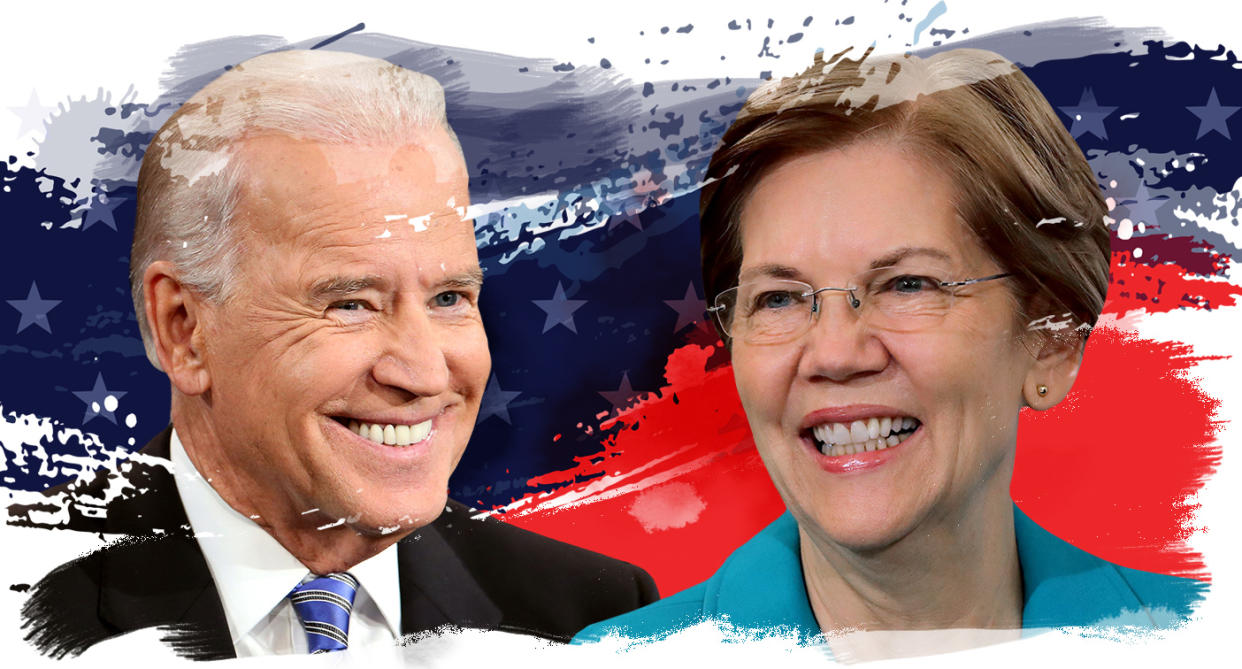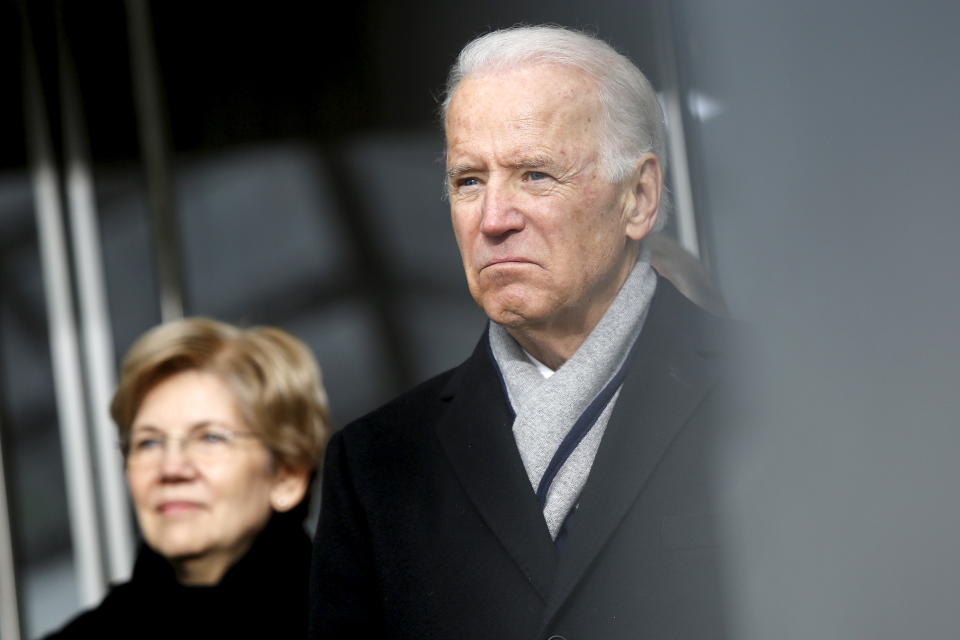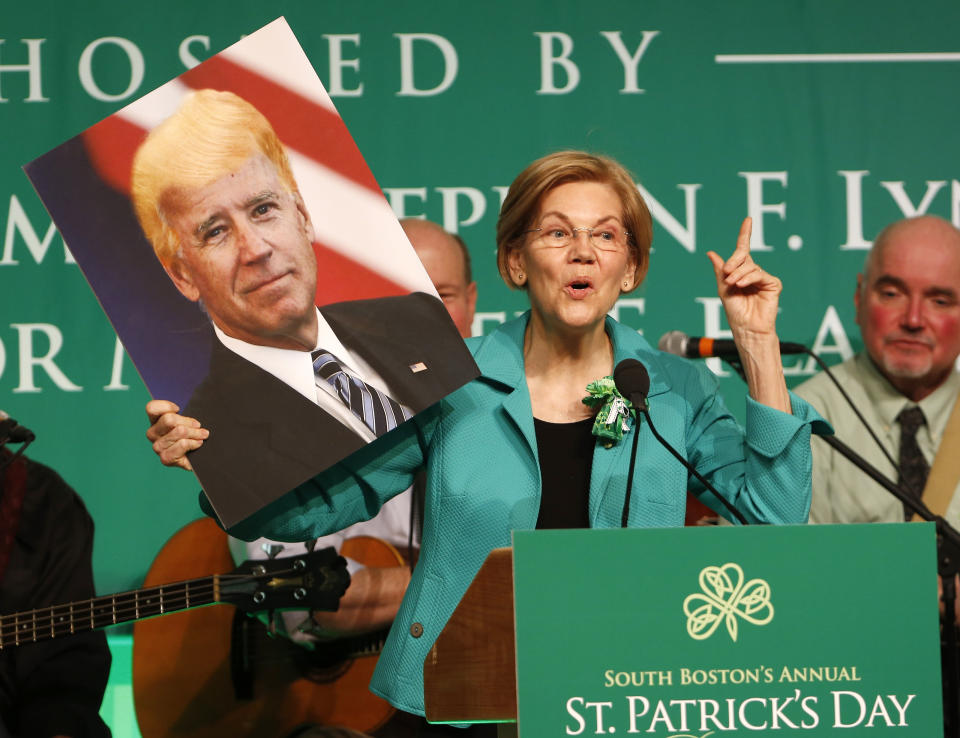Joe Biden and Elizabeth Warren have a history. If he runs, it may come back to haunt him.

Four years ago, I interviewed Vice President Joe Biden in his West Wing office about his recollections of the 1980 presidential election.
I went back through that interview recently, and discovered comments by Biden about Sen. Elizabeth Warren that have fresh resonance, as Biden considers a run for president, and with Warren having already announced her own intentions.
Back in 2015, Biden was thinking about running in 2016, though he had not yet said so publicly. Warren was often mentioned as a potential candidate, despite her adamant statements that she did not plan to run.
At the time, I wanted to talk to Biden about the fight among Democrats in 1980 over Sen. Ted Kennedy and President Jimmy Carter, which was the subject of a book I had been working on. (The book, “Camelot’s End: Kennedy vs. Carter and the Fight That Broke the Democratic Party,” will be published Jan. 22.) I was interested in how the issues that split the party then might still be relevant today. As we discussed this theme, Biden repeatedly brought up Warren’s name, unprompted. It happened four times in a 40-minute conversation.

“There is kind of a parallel there,” Biden told me when I asked — after Biden had brought up the Massachusetts senator who now holds Kennedy’s old seat — if she was trying to pull the Democrats back to the kind of platform Kennedy was running on in 1980.
Every time Biden compared his views with Warren’s, he held himself out as pursuing “common sense” and having a positive vision of helping the poor and working class.
“It’s not about punishing the rich, which is the fundamental premise of Elizabeth — who’s smart as hell and a good person,” Biden said. “It’s about, What do we do about the fact that the middle class has lost an incredible amount of wealth and has not seen a pay raise?”
Biden and Warren in fact had quite a history by that point. Warren had been an antagonist of Biden’s in 2002, when she criticized him in a New York Times op-ed for his support of a bill that made it harder for consumers to declare bankruptcy.
The headline of Warren’s piece read: “A Quiet Attack on Women.” Warren, then a law professor at Harvard, detailed how the legislation would have a disproportionate impact on women, and implied that Biden was supporting the bill because of the finance industry’s outsized influence in Delaware, his home state.
“Banking and credit lobbyists have been trying to change the bankruptcy laws for years,” Warren wrote. “The current bill was stuck in conference between the Senate and House until Senator Joseph Biden of Delaware — where many banks and credit-card issuers are incorporated — agreed to vote with Republicans on almost all the issues that were holding up the bill.”
This critique was clearly still on Biden’s mind in 2015, when he talked to me about reforms to the credit card industry enacted by President Obama’s administration.
“The credit card change we made, that alone has saved consumers over $20 billion a year,” he said. “If you look at Elizabeth Warren’s argument on this: ‘You should have just shut the suckers down.’” This was a reference to Warren’s comment in a 2009 interview with PBS, where she said that “We permit credit products to pass every day in commerce in America that if they were toasters, we would shut those folks down.”

Warren went on to outline her view that the credit card industry should be regulated by “the same basic safety standards for credit products that we have for physical products.”
According to Biden, in contrast to Warren’s approach to the credit industry, others were saying, “You can’t go after these guys.”
“We came up with a pragmatic, but fundamental, change in the way credit card companies could operate,” Biden said.
A spokesman for Warren, asked to comment for this article, declined to do so. A Biden spokesman also declined to comment.
Later in 2015, Biden invited Warren to lunch at the vice presidential residence. He was by that time convinced that if he ran for president in 2016, he would want her to be his running mate, according to reports.
But Biden was also aware of how some of his past votes on financial regulation would be targets in a 2016 campaign, as they will be if he runs in 2020. “The biggest mistake I made in my whole career,” he said, was voting to get rid of Glass-Steagall, the Depression-era law that prohibited commercial banks from engaging in investment banking.
The law was partially repealed in 1999. Biden defended President Bill Clinton, who signed the 1999 legislation, as doing “a good job in the economy at the time, shifting us toward capital formation.”
“But,” he said, capital formation “became a holy grail,” and Democrats became too afraid of regulating Wall Street. “We got to change that. We got to put this back in a lane where there is genuine oversight, where the cowboys can’t take the risk we have to pay for,” Biden said.
Biden, who did not run in 2016, recognized the potency of Warren’s populist anti-Wall Street appeal. If he runs this time, this debate will likely resurface. And in the heat of a high-stakes campaign, their past jabs at each other will likely seem like an exchange of pleasantries.

_____
Read more from Yahoo News:


